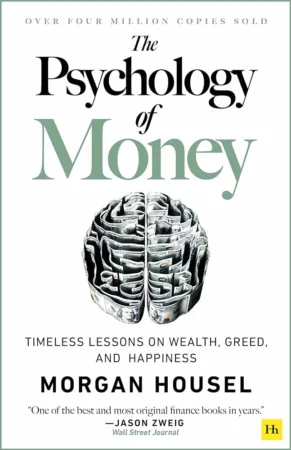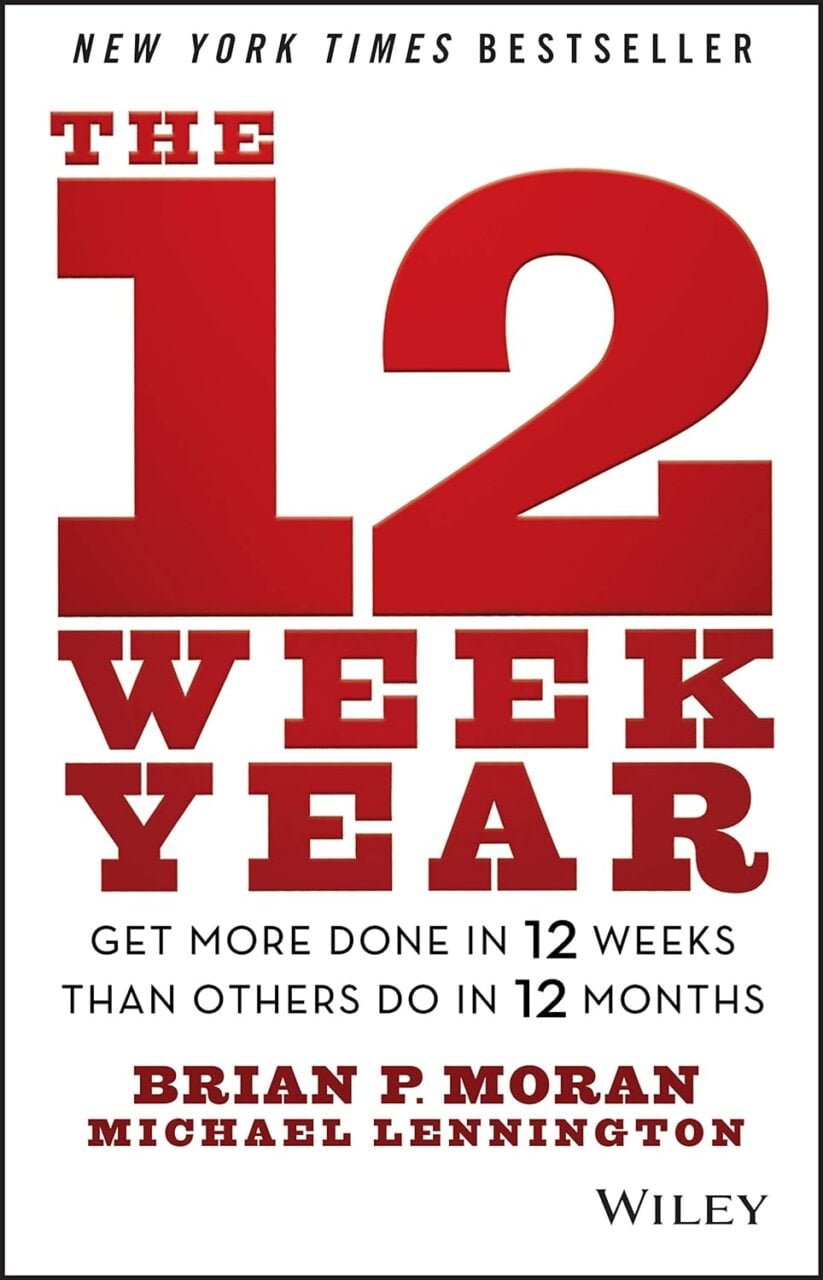The Psychology of Money isn’t your typical finance book.
There’s no one-size-fits-all formula to get rich or traditional financial advice like set a budget or create a savings account.
Instead, it discusses the psychological aspects of money management and explores the complex relationship between money and human behaviour.

7 key takeaways from the book…
In the Psychology of Money, Morgan Housel shares a number of different stories that teaches us how to have a better relationship with money and to make smarter financial decisions.
1. Everyone is different and nobody is crazy
Your relationship with money depends largely on your upbringing.
If one child was born into poverty and another child was raised with generational wealth, they will grow up with different money habits.
Even as adults, our views on money will depend on our personal experience.
Baby Boomers, Millennials and Generation-Z will all have different attitudes, beliefs and habits when it comes to money.
Housel gives the example that a stock broker who lost everything during the Great Depression experiences something a tech worker in the late 90s can’t imagine.
We’re all wired differently – we have different personalities, are from different generations, raised by different parents, hold different values, born into different economies, experience different job markets, learn different lessons and have different goals.
We are also irrational and emotional beings who aren’t very good at long-term thinking. This is why we need to learn how to manage our emotions and biases related to money.
We can conclude that success with money is not just about intelligence or strategy, it’s about our behaviour. It’s a soft skill that we can learn.
“Your personal experiences with money make up maybe 0.00000001% of what’s happened in the world, but maybe 80% of how you think the world works.”
Morgan Housel, The Psychology of Money
2. Wealthy vs. rich
Wealth is what you don’t see – it’s the money you have not spent.
Being rich means you have income but being wealthy means you have unspent savings and investments for your future.
Spending money to show other people how much money you have is the fastest way to have less money.
In the book, Housel uses Rihanna as an example. Rihanna nearly went bankrupt after overspending and sued her financial advisor.
The advisor responded: “Was it necessary to tell her that if you spend money on things, you will end up with the things and not the money?”
Apparently so!
Financial success is not about who earns more, but who keeps more. Our focus should be on saving and retaining wealth, not just earning it.
3. Stop shifting the goalpost
Countless individuals lose everything because they felt the millions they had was not enough.
It’s easy to have a goalpost that keeps moving. Once you achieve your goals, you look toward the next goal. And the cycle continues.
But at a certain point, we need to walk away from risk. We need to stop comparing ourselves to others. We need to be content with enough.
“There is no reason to risk what you have and need for what you don’t have and don’t need”
Warren Buffet
Housel advises maintaining humility and understanding the value of not taking undue risks. Learn to identify need versus greed.

4. Man in the car paradox
Housel shares a story about when he used to be a valet. With it he shared some interesting insight into how we think about wealth.
He concludes that no one is impressed with your possessions as much as you are.
People rarely think somebody is cool if they see them driving a nice car. Instead, people imagine how cool other people would think they are if they had that car.
“The best part of being a valet is getting to drive some of the coolest cars to ever touch pavement. Guests came in driving Ferraris, Lamborghinis, Rolls-Royces — the whole aristocratic fleet.
It was my dream to have one of these cars of my own, because (I thought) they sent such a strong signal to others that you made it.
You’re smart. You’re rich. You have taste. You’re important. Look at me.
The irony is that I rarely if ever looked at them, the drivers. When you see someone driving a nice car, you rarely think “Wow, the guy driving that car is cool.”
Instead, you think, “Wow, if I had that car people would think I’m cool.”
Subconscious or not, this is how people think. There is a paradox here:
People tend to want wealth to signal to others that they should be liked and admired. But in reality those other people often bypass admiring you, not because they don’t think wealth is admirable, but because they use your wealth as a benchmark for their own desire to be liked and admired.”
Morgan Housel, The Psychology of Money
If you’re trying to acquire wealth because you believe this will make people like, admire and respect you then you are going to be disappointed.
5. Compounding
Long-term thinking is required for financial success.
Good investing isn’t about earning the highest returns, it’s about earning pretty good returns that can be sustained and repeated for long periods of time.
Housel uses Warren Buffett as an example here, an incredible investor who is very well-known for his commitment to compounding.
Buffett started investing when he was 10-years-old, and he did so until he was at least 89-years-old.
If he started investing in his 30s and retired in his 60s; few people would have heard of him.
That is the power of compounding.
It’s also worth noting that $81.5 billion of Buffett’s $84.5 billion net worth came after his 65th birthday.
And that is the power of patience.
6. Luck vs. risk
Housel shares a few nuggets within the luck vs. risk chapter.
Success is not solely the result of hard work, individual effort can only get you so far. Luck and risk play a role in almost all outcomes.
“Some people are born into families that encourage education; others are against it. Some are born into flourishing economies encouraging of entrepreneurship; others are born into war and destitution.
I want you to be successful, and I want you to earn it. But realize that not all success is due to hard work, and not all poverty is due to laziness. Keep this in mind when judging people, including yourself.”
Morgan Housel, The Psychology of Money
The investment decisions you make on 1% of days matter the most.
Failure happens, unknown risks are inevitable and preparing for these is challenging. Nobody can accurately predict the economy fluctuations, pandemics and other unprecedented events that will happen.
Housel recommends we focus less on specific individuals and case studies and more on broad patterns.
“A good definition of an investing genius is the man or woman who can do the average thing when all those around them are going crazy.”
Morgan Housel, The Psychology of Money
Housel uses Bill Gates to make his point about luck versus risk.
He explains that yes, Gates was smart, hardworking and had a rare affinity with computers. But he was also lucky to attend one of the only high schools in his time with a computer. Housel estimates the odds of that happening to be a 1 in a million chance.
Gates eventually co-founded Microsoft with his classmate Paul Allen.
Their school friend, Kent Evans, shared their skills and passion with computers. But Evans died on a mountaineering accident before he graduated high school. The odds of this are roughly one in a million.
Both Gates and Evans fell on 2 extreme ends of luck and risk.
7. The end goal is freedom
The most important takeaway from the book is this.
The ultimate value of money is not to buy luxury goods, but to gain control over one’s time and life.
“Use money to gain control over your time, because not having control of your time is such a powerful and universal drag on happiness.”
Morgan Housel, The Psychology of Money
The ultimate purpose of money is to gain freedom, the ability to do what you want, when you want with whom you want, for as long as you want.
That is the true sign of success!
Understanding money isn’t just about being smart or educated. Instead, we need to understand our own relationship with money and how our behaviours and emotions influence our decisions.
Once we do that, we will be on our way to financial success. We recommend reading The Psychology of Money to get a better understanding of your relationship with money while starting your journey to financial success.

Currently reading
The 12 Week Year

